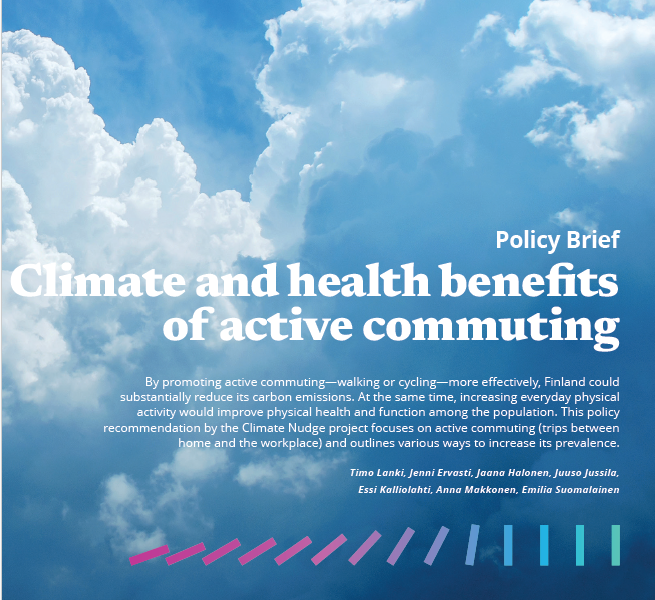Policy brief: Climate and health benefits
of active commuting
By promoting active commuting—walking or cycling—more effectively, Finland could substantially reduce its carbon emissions. At the same time, increasing everyday physical activity would improve physical health and function among the population. This policy recommendation by the Climate Nudge project focuses on active commuting (trips between home and the workplace) and outlines various ways to increase its prevalence.
Finland urgently needs additional climate actions to meet the national and EU-level emission reduction targets. At the same time, insufficient physical activity among Finns is detrimental to the population’s physical health and functional capacity. Increasing the prevalence of active commuting could simultaneously help tackle both these challenges. However, achieving this goal requires utilizing all existing measures.
Download pdf here: https://ilmastotuuppaus.fi/wp-content/uploads/sites/4/2024/12/CN-policy-brief-commuting.pdf

Articles
Childhood Lifestyle Behaviors and Mental Health Symptoms in Adolescence. Eero A. Haapala, Marja H. Leppänen, Silja Kosola, Kaija Appelqvist-Schmidlechner, Siiri-Liisi Kraav, Juuso J. Jussila, Tommi Tolmunen, David R. Lubans, Aino-Maija Eloranta, Ursula Schwab, Timo A. Lakka. JAMA Network Open, 2025.
Associations of active commuting and leisure-time physical activity with perceived cognitive function and work ability among Finnish employed adults: a population-based study. Juuso J. Jussila, Anna Pulakka, Kaija Appelqvist-Schmidlechner, Jenni Ervasti, Jaana I. Halonen, Essi Kalliolahti, Jouni Lahti, Santtu Mikkonen, Paula Salo & Timo Lanki. BMC Public Health volume, 2025.
Associations Between Active Commuting and Sickness Absence in Finnish Public Sector Cohort of 28 485 Employees. Essi Kalliolahti, Kia Gluschkoff, Timo Lanki, Jaana I. Halonen, Paula Salo, Tuula Oksanen, Jenni Ervasti. Scandinavian Journal of Medicine & Science in Sports, 2024.
Changes in active commuting and changes in work ability and recovery from work in 16,778 Finnish public sector employees. Essi Kalliolahti, Kia Gluschkoff, Eija Haukka, Timo Lanki, Juuso J. Jussila, Jaana I. Halonen, Tuula Oksanen, Jenni Ervasti. ScienceDirect, 2024.
Association between active commuting and low-grade inflammation: a population-based cross-sectional study. Sara Allaouat, Jaana I Halonen, Juuso J Jussila, Pekka Tiittanen, Jenni Ervasti, Tiia Ngandu, Santtu Mikkonen, Tarja Yli-Tuomi, Pekka Jousilahti, Timo Lanki. European Journal of Public Health, December 2023.
Changes in active commuting and changes in health: Within- and between-individual analyses among 16 881 Finnish public sector employees. Eija Haukka, Kia Gluschkoff, Essi Kalliolahti, Timo Lanki, Juuso J. Jussila, Jaana I. Halonen, Tuula Oksanen, Paula Salo, Jenni Ervasti. Preventive Medicine, Volume 177, December 2023.
Are active school transport and leisure-time physical activity associated with performance and wellbeing at secondary school? A population-based study. Juuso J Jussila, Anna Pulakka, Jaana I Halonen, Paula Salo, Sara Allaouat, Santtu Mikkonen, Timo Lanki. European Journal of Public Health, 2023.
Associations between commute mode use and self-rated health and work ability among Finnish public sector employees. Essi Kalliolahti, Ville Aalto, Paula Salo, Timo Lanki, Jenni Ervasti, Tuula Oksanen. Scandinavian Journal of Public Health, 2023.
Associations of leisure-time physical activity and active school transport with mental health outcomes: A population-based study. Juuso J. Jussila, Anna Pulakka, Jenni Ervasti, Jaana I. Halonen, Santtu Mikkonen, Sara Allaouat, Paula Salo, Timo Lanki. Scandinavian Journal of Medicine & Science in Sports, 2022.
The Ethics of Climate Nudges: Central Issues for Applying Choice Architecture Interventions to Climate Policy. Helena Siipi & Polaris Koi. Cambridge University Press. 1-18, 2021.

